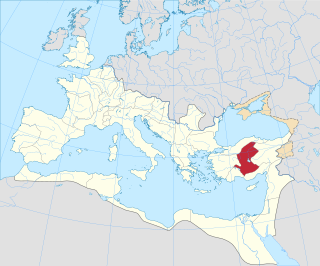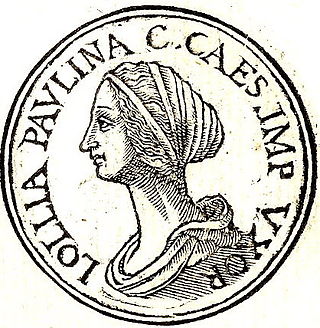Related Research Articles
Quintus Fulvius Flaccus, son of Marcus Fulvius Flaccus, was consul in 237 BC, fighting the Gauls in northern Italy. He was censor in 231 BC, and again consul in 224 BC, when he subdued the Boii. He was a praetor in 215 BC and in 213 BC Master of Horse in the dictatorship of Gaius Claudius Centho.

The gens Valeria was a patrician family at ancient Rome, prominent from the very beginning of the Republic to the latest period of the Empire. Publius Valerius Poplicola was one of the consuls in 509 BC, the year that saw the overthrow of the Tarquins, and the members of his family were among the most celebrated statesmen and generals at the beginning of the Republic. Over the next ten centuries, few gentes produced as many distinguished men, and at every period the name of Valerius was constantly to be found in the lists of annual magistrates, and held in the highest honour. Several of the emperors claimed descent from the Valerii, whose name they bore as part of their official nomenclature.
The gens Fulvia, originally Foulvia, was one of the most illustrious plebeian families at ancient Rome. Members of this gens first came to prominence during the middle Republic; the first to attain the consulship was Lucius Fulvius Curvus in 322 BC. From that time, the Fulvii were active in the politics of the Roman state, and gained a reputation for excellent military leaders.

The gens Manlia was one of the oldest and noblest patrician houses at Rome, from the earliest days of the Republic until imperial times. The first of the gens to obtain the consulship was Gnaeus Manlius Cincinnatus, consul in 480 BC, and for nearly five centuries its members frequently held the most important magistracies. Many of them were distinguished statesmen and generals, and a number of prominent individuals under the Empire claimed the illustrious Manlii among their ancestors.

The gens Junia or Iunia was one of the most celebrated families of ancient Rome. The gens may originally have been patrician, and was already prominent in the last days of the Roman monarchy. Lucius Junius Brutus was the nephew of Lucius Tarquinius Superbus, the seventh and last King of Rome, and on the expulsion of Tarquin in 509 BC, he became one of the first consuls of the Roman Republic.

The gens Marcia, occasionally written Martia, was one of the oldest and noblest houses at ancient Rome. They claimed descent from the second and fourth Roman Kings, and the first of the Marcii appearing in the history of the Republic would seem to have been patrician; but all of the families of the Marcii known in the later Republic were plebeian. The first to obtain the consulship was Gaius Marcius Rutilus in 357 BC, only a few years after the passage of the lex Licinia Sextia opened this office to the plebeians.

The gens Sempronia was one of the most ancient and noble houses of ancient Rome. Although the oldest branch of this gens was patrician, with Aulus Sempronius Atratinus obtaining the consulship in 497 BC, the thirteenth year of the Republic, but from the time of the Samnite Wars onward, most if not all of the Sempronii appearing in history were plebeians. Although the Sempronii were illustrious under the Republic, few of them attained any importance or notice in imperial times.
Publius Licinius Crassus Dives was consul in 205 BC with Scipio Africanus; he was also Pontifex Maximus since 213 or 212 BC, and held several other important positions. Licinius Crassus is mentioned several times in Livy's Histories. He is first mentioned in connection with his surprising election as Pontifex Maximus, and then several times since in various other capacities.

Galatia was the name of a province of the Roman Empire in Anatolia. It was established by the first emperor, Augustus, in 25 BC, covering most of formerly independent Celtic Galatia, with its capital at Ancyra.

The gens Lollia was a plebeian family at Rome. Members of the gens do not appear at Rome until the last century of the Republic. The first of the family to obtain the consulship was Marcus Lollius, in 21 BC.
Gaius Bellicius Flaccus Torquatus Tebanianus was a Roman senator during the reign of Hadrian. He was consul posterior in 124 with Manius Acilius Glabrio as his colleague.

The gens Plautia, sometimes written Plotia, was a plebeian family at ancient Rome. Members of this gens first appear in history in the middle of the fourth century BC, when Gaius Plautius Proculus obtained the consulship soon after that magistracy was opened to the plebeian order by the Licinio-Sextian rogations. Little is heard of the Plautii from the period of the Samnite Wars down to the late second century BC, but from then to imperial times they regularly held the consulship and other offices of importance. In the first century AD, the emperor Claudius, whose first wife was a member of this family, granted patrician status to one branch of the Plautii.
The gens Bellicia was an aristocratic plebeian family at ancient Rome, which flourished during the first and second centuries. The Bellicii rose to prominence from Gallia Narbonensis, attaining senatorial status with Gaius Bellicius Natalis, who was appointed consul suffectus in AD 68.
References
- ↑ Parker 2000, p. 455.
- ↑ Parker 2000, p. 462.